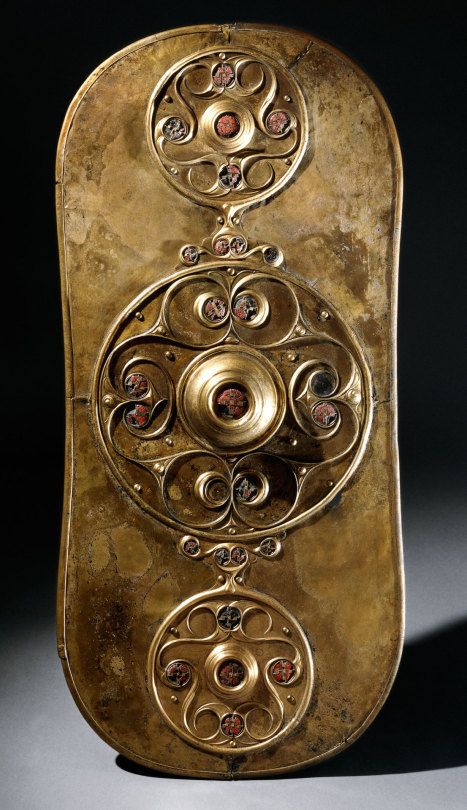Meaning
Brennus is a name that carries with it a weight of history, myth, and cultural significance, deeply rooted in the ancient Celtic world. While its precise meaning remains elusive, its connection to warfare and leadership makes it a fascinating subject for exploration.
The Celts, a diverse collection of tribes who inhabited much of Europe during the Iron Age, were renowned for their warrior culture. Warfare was integral to their social structure, serving as a means of acquiring wealth, prestige, and land. Leaders known for their courage and military prowess were highly revered.
The name Brennus itself appears to have originated from an ancient Celtic root word possibly related to “fiery,” “shining,” or “brave.” This linguistic connection suggests that the name was likely bestowed upon individuals who embodied these qualities, particularly those who excelled in battle.
One of the most famous figures associated with the name Brennus is Brennus of the Gauls, a legendary leader who led an invasion into Rome in 390 BCE. Historical accounts depict Brennus as a fierce and cunning warrior, leading his Gallic army to victory over the Romans at the Battle of Allia.
The story goes that after sacking Rome, Brennus famously threw his sword upon the scales during negotiations with Roman officials, declaring “Vae victis!” (“Woe to the vanquished!”) This act symbolizes the ruthless determination and military prowess associated with the name Brennus.
Though the historical accuracy of the story surrounding Brennus of the Gauls is debated by scholars, it has nonetheless cemented his place in popular imagination as a symbol of Celtic warrior strength and audacity. The name Brennus continues to resonate today, evoking a sense of bravery, leadership, and a connection to the rich history of the ancient Celts.
Brennus is a name with rich historical roots, its meaning shrouded in some mystery and open to interpretation.
One prominent theory suggests that Brennus derives from the *Celtic* root “bren,” which translates to ” **burnt**” or ” **fire**.”
This could link the name to a fiery temperament, strength, or even a connection to the element of fire in Celtic mythology.
Another interpretation points to a possible association with the *Gaulish* word “brenn,” meaning ” **chieftain**” or ” **leader**.”
This would lend Brennus an aura of authority and dominance, reflecting leadership qualities.
Adding another layer of complexity, some scholars propose that Brennus could be related to the *Latin* word “brumus,” meaning ” **noise**” or ” **thunder**.”
This interpretation might symbolize a powerful and imposing presence.
The name’s historical significance is further amplified by its association with Brennus of *Gaul*, a legendary warrior who led a Gallic invasion of *Italy* in the 4th century BC.
According to Roman accounts, he famously sacked the city of **Rome** and stole the sacred *spoils* of war known as the ” **Auguries of Romulus**.”
This act of defiance against a powerful empire cemented Brennus’s place in historical legend.
The enduring legacy of Brennus, both in name and myth, continues to intrigue historians and language enthusiasts alike.
Its multiple potential meanings and the association with a prominent warrior contribute to its complexity and lasting appeal.
Origin
The name Brennus has a rich history, steeped in Celtic lore and mythology. Its origins lie within Gaulish culture, an ancient Indo-European civilization that inhabited much of modern-day France, Belgium, Switzerland, and parts of Germany and Italy.
The meaning of Brennus is debated among scholars, with several theories proposed. One prominent theory suggests it derives from the Gaulish words “bren” or “brenos,” which mean “bold” or “powerful.” This interpretation aligns with the historical portrayal of Brennus as a courageous and formidable warrior leader.
Another theory posits that Brennus is connected to the Gaulish word “brennos,” meaning “to burn” or “flame.” This association might reflect the fiery nature of his conquests or the destructive power attributed to him in ancient legends.
Regardless of its exact etymology, Brennus is most prominently known for his role in the legendary sack of Rome in 390 BC. According to Roman historians like Livy and Dionysius of Halicarnassus, Brennus led a Gallic army that besieged and conquered the Eternal City.
While the historical accuracy of this account is disputed by some modern scholars, the story has permeated Western culture as a symbol of Gallic military prowess and audacity. The legend emphasizes the fearsome reputation of Brennus and his warriors, solidifying their place in Roman history and popular imagination.
The name Brennus itself became synonymous with strength and bravery, often used in literature and art to portray powerful figures. Its enduring legacy serves as a testament to the lasting impact of Gaulish culture on Western civilization.
The name Brennus is steeped in historical mystery and legend, its origins shrouded in the mists of time. It first emerges in Roman accounts, where it is associated with a legendary Celtic warrior leader who led a fierce Gallic invasion of Rome in the 6th century BCE.
One of the most prominent early mentions of Brennus appears in Livy’s “Ab Urbe Condita Libri,” an influential historical work chronicling Roman history. In this account, Brennus and his army lay siege to Rome, ultimately breaching its walls and sacking the city. The story depicts him as a formidable leader, wielding great strength and inspiring his troops with courage.
Another significant Roman source mentioning Brennus is Dionysius of Halicarnassus’ “Roman Antiquities,” which also narrates the Gallic invasion and siege of Rome. While Dionysius shares Livy’s account of Brennus’ prowess and military skill, he adds intriguing details about the leader’s origins.
Dionysius describes Brennus as hailing from a powerful Celtic tribe called the Senones, who resided in what is now modern-day central France. He portrays Brennus as a charismatic chieftain who united various Gallic tribes under his banner, forming a formidable force that posed a serious threat to Rome.
The accounts of Livy and Dionysius, while valuable for understanding the legendary figure of Brennus, are not without their critics. Some scholars argue that these Roman sources may have exaggerated or embellished Brennus’ role in the Gallic invasion, potentially as propaganda to bolster Roman national pride and emphasize the city’s resilience.
Despite the debate surrounding the historicity of certain details, Brennus remains a captivating figure in ancient history. His name has endured for centuries, becoming synonymous with Celtic warrior prowess and the enduring struggle between Rome and its Gallic adversaries.
History
The name Brennus carries a weight of legend and historical significance, intertwined with tales of bravery, cunning, and ambition.
Originating from the ancient Celtic world, Brennus is believed to have roots in the Gaulish language. The most common interpretation suggests it derives from “bren,” meaning “to burn” or “fiery.” This etymology aligns with the fierce reputation often attributed to Brennus figures in history and mythology.
One of the most prominent accounts of Brennus comes from Roman historians like Livy, who recount his legendary role as the leader of a Gallic army that invaded Rome in the 4th century BCE. These stories depict Brennus as a skilled warrior and strategist who led his troops with unmatched ferocity.
According to legend, Brennus’s army sacked the city of Rome during the Battle of Allia. However, he was ultimately slain during the conflict, leaving behind a legacy that continues to resonate today.
Brennus’ name has become synonymous with strength and courage in Celtic folklore, often appearing as a hero or antagonist in ancient tales. His story serves as a reminder of the powerful cultural influence wielded by the Celts during the ancient world.
The legend of Brennus encompasses several key elements:
* **Military prowess:** Brennus is consistently portrayed as a formidable warrior leader, capable of commanding large armies and achieving tactical victories against formidable opponents.
* **Political ambition:** While primarily remembered for his military exploits, Brennus’s actions suggest a desire for territorial expansion and political influence, driving him to invade Rome.
* **Tragic downfall:** Despite his initial successes, Brennus ultimately meets a tragic end during the Battle of Allia, highlighting the unpredictable nature of war and the fragility of victory.
Though historical evidence surrounding Brennus remains limited, his legend persists as a captivating tale that continues to be retold and reinterpreted throughout centuries.
His name serves as a reminder of the complex interplay between history, mythology, and cultural memory, forever linking Brennus to the enduring legacy of the ancient Celts.
The name Brennus has echoed through history, forever linked to a pivotal moment in ancient Roman legend: the Sack of Rome in 390 BC.
Brennus was the legendary leader of a Gallic tribe known as the Senones, who descended from northern Europe into the Italian peninsula during this era.
His name, unfortunately, is shrouded in mystery. Its origins remain debated among scholars, with some theories suggesting connections to Celtic roots or even pre-Indo-European languages.
Some speculate that “Brennus” could be related to the Celtic word for “bear,” hinting at a fierce and powerful leader. Others propose links to words denoting strength, bravery, or even rulership.
Regardless of its precise etymology, Brennus’ name became synonymous with conquest and destruction after his forces famously sacked Rome.
This event, known as the Gallic Sack of Rome, shook the very foundation of Roman civilization.
Legend describes Brennus leading his warriors in a bold campaign that culminated in breaching Rome’s defenses. They pillaged the city’s treasures, burned buildings, and inflicted heavy losses on the Roman population.
This disastrous defeat forced the Romans to pay a massive ransom to secure the release of their citizens and the withdrawal of the Gallic forces.
The sack remains a significant turning point in Roman history, marking the first time Rome had been conquered by an external force.
It served as a stark reminder of the vulnerability of even the mightiest empires and fueled Rome’s resolve to expand its military prowess and consolidate its power.
Brennus himself met his end during or after the siege, though details are murky. Some accounts claim he was killed in battle, while others suggest he perished later from wounds sustained during the conquest.
The story of Brennus and his sack of Rome has endured through the centuries, inspiring countless works of literature, art, and music.
It serves as a potent reminder of the fragility of civilization and the enduring legacy of those who shaped history.
- 30 Best B2B Leads Database Providers to Try in 2025 - April 26, 2025
- Best Clay Alternatives for 2025 - April 26, 2025
- Best Lusha Alternatives for 2025 - April 26, 2025


